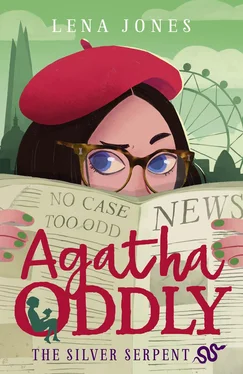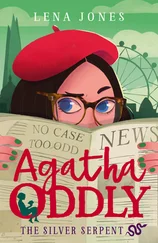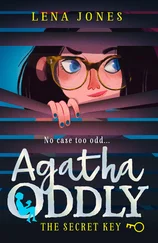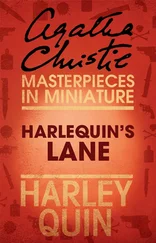‘She’s watching an information reel,’ Arthur says.
‘She’s actually watching something?’ I say uncertainly. I’m not sure if he’s teasing me.
‘Yep. Those glasses she’s wearing are another Guild invention – the Spectacular. The lenses are really tiny screens.’
‘Wow,’ I say again. Then I lean forward. ‘So, what’s the case?’ I ask again eagerly.
‘Oh, you’ll like this one,’ he says. ‘It’s about the National Gallery.’
‘Seriously?’
‘I’m always serious about art,’ he says. I look at this boy – with his floppy blond hair and dimples – and can’t imagine he’s ever serious about anything.
He draws a sheet of paper from the folder the professor gave us.
‘This is Dr Elizabeth MacDonald, the director of the National Gallery,’ he says, showing me a newspaper clipping of a woman standing in front of Sunflowers . She’s an elderly lady, in a tweed skirt-suit with loafers and is dwarfed by the large canvas. Her white hair is pinned back in a neat bun. She resembles a kindly nanny from a children’s book far more than the director of one of the most famous art galleries in the world.
‘OK …’ I say, scanning her clothing, her stance and her expression. I don’t believe you can work out much about a person from a photograph – especially a posed one, when they’re on their guard – but a person’s choice of dress says a little about how they want to be seen. And how a person desires to be viewed offers certain hints regarding the way they feel about themselves. Elizabeth MacDonald, I decide, is clearly secure enough in her knowledge and experience of the art world not to feel the need to resort to designer clothing or outrageous dress, in order to make her mark.
He draws another sheet from the file: a square photograph.
‘And this is Sheila Smith, the senior curator.’ The picture shows a woman with wavy blonde hair and bright-red lipstick. He places a one-page document below the image. ‘And this is the report on her disappearance.’
I look up sharply. This is the first time he’s lost his jovial tone and seems genuinely grave. ‘Disappearance?’
‘That’s right. She was reported missing yesterday morning, by Dr MacDonald – although it seems that no one’s seen her since Friday night, when she failed to board a flight.’
I take a moment to process this. ‘How long have you been working on this case then?’
‘I’d only just started when I met you at the Van Gogh yesterday. I’d come straight from a meeting with Dr MacDonald. In fact, I had thought I’d be teamed up with Sofia. Between ourselves, I was quite relieved when she had to fill in for someone who’s off sick. She’s a bit … uptight, if you know what I mean?’
I laugh. ‘So, where was Sheila meant to be going?’
He draws out a notebook from his rear trouser pocket and consults his notes. ‘Colombia,’ he replies, ‘to view a painting that’s just come on the market. The National Gallery’s interested in buying it. It was the art dealer over there, in Bogotá, who called Dr MacDonald on Monday morning, to say Sheila had never arrived.’
‘Has anyone checked if she boarded the plane?’
He nods. ‘Dr MacDonald made enquiries with the airport. It was a late-night flight – eleven o’clock – but Sheila never checked in.’
‘What about her family?’
‘They haven’t heard from her.’
‘Why didn’t someone just call the police?’ I ask. ‘It sounds like a straightforward missing person’s case.’
‘Ah. The police aren’t convinced there’s “foul play” involved. They say Ms Smith is perfectly within her rights to take off without notifying anyone. They did have a quick check of her flat, and there was no sign of a struggle. Also, her passport’s missing, so she could have gone anywhere – by ferry, if not by plane. They said they’re happy to hand it over to a private investigator for now, which is why Dr MacDonald contacted us. There’s an agreement that we must tell the police if we turn up anything serious. And they said they’ll have to intervene if we haven’t found her by Friday evening.’
‘We need to get a move on then,’ I say. ‘What else is in that folder?’
‘Not much – it’s waiting to be filled. Oh – I’m meant to give you this.’ He hands me a fake ID badge, with my name beneath my photo and a company name.
‘Who are Prodigal Investigations?’ I ask.
‘That’s our undercover employer, while we’re working this case. It avoids awkward questions about the Guild. The story goes that we’ve been recruited by a PI agency that specialises in hiring promising young people. It’s just to show to anyone who asks too many questions.’
‘Fair enough,’ I say and stash the badge in the outside pocket of my backpack.
He skims through his notes. ‘What I found out from my tête-à-tête with Dr MacDonald was that she’s approaching retirement, and that she’s from an old Scottish clan who own lots of land. They even have an island! It’s called the Isle of Fairhaven. She’s planning on going to live there when she retires from the gallery.’ He puts on a pretty convincing old lady’s voice – complete with Scottish accent – and says, ‘I’m going to pass the autumn of my years on the Isle of Fairhaven.’
I laugh. ‘Is that what she sounds like?’
‘It is, and that’s what she said, verbatim, when I interviewed her yesterday.’ He slips back into Scots mode. ‘She’s such a dear, wee little thing.’ If I’m honest, part of me is a bit uncomfortable about his mockery of Dr MacDonald (I’ve been on the receiving end of too much teasing myself) but I can’t help laughing again – he’s too funny.
‘Her own island,’ I murmur. I picture the tiny plot of land in the Serpentine, to which I’ve rowed from time to time, and wonder how big the MacDonald clan’s isle might be.
‘So where do you think we should start?’ he asks me.
I’m flattered that Arthur thinks enough of me to ask my opinion, when he’s clearly the more experienced agent. I do a mental run-through of important early procedures, from a book I’ve read five times: Complete Crime Scene Investigation Handbook. It tells you that one of the first things is to think of the obvious, and so I say, ‘Have you been to Sheila’s home yet, to search for clues?’
He shakes his head. ‘No. I haven’t really started yet.’
I draw Sheila’s photo close for a good look. She’s probably in her early fifties, dressed in a trouser suit, with one hand in her trouser pocket. With her glossy, blonde, shoulder-length hair, she has a vintage-film-star quality, like Greta Garbo or Rita Hayworth.
‘When was Sheila last seen?’ I ask him. ‘I mean, I know it was Friday night, but what time and where?’
‘At work. She got her coat at five thirty and said goodbye to all the staff. Apparently, she prides herself on knowing the names of all her colleagues, on both the art history and art maintenance sides.’
I like the sound of Sheila.
‘And did anyone witness her leaving through the main entrance?’
He consults his notebook. ‘No. The person on reception was busy with a tour group, so nobody actually saw her go.’
‘So she might have been kidnapped directly from the gallery.’
‘Or she might even still be there,’ he suggests. ‘Either hiding, for some reason, or tied up by an assailant.’
This sounds unlikely to me. ‘Surely someone would have come across her by now, if she was being kept hostage in the building.’
‘A good investigator doesn’t rule anything out,’ he says.
‘True. So we need to check the security cameras to make sure she did leave, and see what time it was.’
Читать дальше












